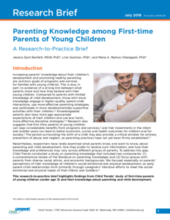Displaying 201 - 210 of 496
The current longitudinal study examined the prevalence, overlap, and impact of adverse childhood experiences (ACEs) in a sample of Brazilian children and adolescents who use city streets as spaces for socialization and survival (i.e., street-involved youth).
This book explains the neurological, emotional, and behavioral impacts of violence and trauma experienced by newborns, infants, children, and teenagers.
This article explores the impacts of two common forms of early childhood adversity, maltreatment and placement in institutional care, on children's behavioral, psychiatric, and physical health into adulthood.
This research-to-practice brief highlights findings from Child Trends’ study of first-time parents of young children (under age 3) and their knowledge about parenting and child development.
This project, designed to explore parenting practices across various regions within Zambia, aims to further advance ongoing efforts to support early childhood development (ECD) by informing parenting programmes intended to promote optimal child development.
The current study from the Infant Mental Health Journal addressed whether two institution‐wide interventions in St. Petersburg, Russian Federation, that increased caregiver sensitivity (Training Only: TO) or both caregiver sensitivity and consistency (Training plus Structural Changes: T+SC) promoted better socioemotional and cognitive development than did a No Intervention (NoI) institution during the first year of life for children who were placed soon after birth.
The objectives of this study were to examine the prevalence and type of trauma exposure, and investigate the relationship between prior trauma and serious illness among foster children at end of life.
The authors of this paper sought to explore the psychometric properties and validity of the Achenbach Youth Self-Report and Child Posttraumatic Stress Disorder Symptom Scale among orphans and vulnerable children (OVC) living in Lusaka, Zambia.
This paper identifies some of the key debates about the evidence from outcomes for children placed in foster care, the challenging issues in the design of the system, how it operates and what the outcomes for children look like.
In this article, the authors explore whether current relational health (connectedness) promotes positive outcomes for child welfare-involved youth while controlling for developmental risk (history of adverse, and lack of relationally positive, experiences).


